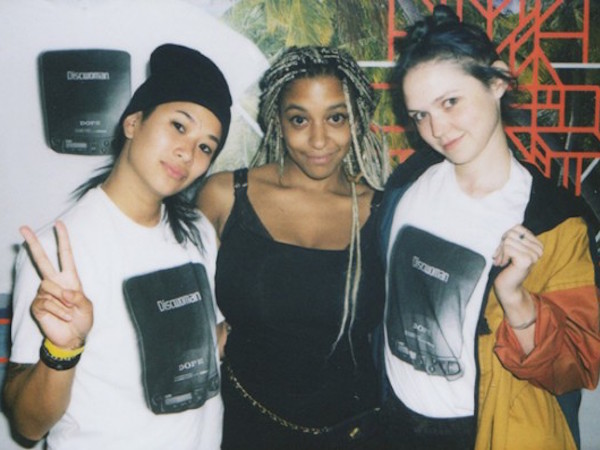1.

Image via Discwoman/Credit: Lauren Gesswein
It should be pretty obvious by now that the music industry is a shitty place for women. From the horrifying Kesha case, to the homogeneity of all male lineups, or just how the media portrays women again and again and again, the music industry is clearly not a safe or welcoming place.
It’s even worse if you focus on specific genres, like dance music. In mainstream dance music, you’re much more likely to see a woman as the artwork for a terrible house song than see a woman in the booth. Industry lists like the World’s Highest Paid DJs and DJ Mag’s Top 100 DJs consistently underrepresent women. There are zero women among 2015’s highest paid DJs, and only three—Nervo, Krewella and Miss K8—on DJ Mag’s list of 100.
There are zero women among 2015’s highest paid DJs, and only three—Nervo, Krewella and Miss K8—on DJ Mag’s list of 100.
In its defense, DJ Mag attempted to be self-aware about the problem, mentioning the lack of women multiple times throughout the list and even asking the featured DJs what they think of the disparity. While it’s definitely good that the problem is being discussed—especially if you are part of it—their concern strikes me as a bit hollow. Although the poll is voted by readers, the excessive campaigning that goes along with it, where DJs are rumored to spend $15,000 on sponsored tweets, only serves to reinforce the status quo, especially at the upper levels of the list where the same men appear again and again.
While some of the answers are thoughtful and considered, the interviewees were a bunch of male DJs talking about women, so inevitably there were some pretty terrible responses—“women can’t handle the DJ lifestyle,” “dance music is everything but sexist, so if there aren’t enough girls in the DJ Mag Top 100, that’s probably because girls aren’t trying hard enough.”
The engrained sexism present in almost every aspect of music can all get a bit depressing, which is why it’s great when women confront the patriarchy of music in a positive way. Discwoman is run by Christine Tran, Frankie Hutchinson, and Emma Burgess-Olson (aka Umfang). It’s a New York-based booking agency and platform focused on showcasing the best female-identified artists making electronic music.
They’ve been featured on Forbes, recently hosted their own Boiler Room set, and are firmly positioned at the forefront of New York’s underground dance scene. In their own words, Discwoman is “not at all the first to bring light to this, but as history teaches us women are consistently ignored, so we’re hardly surprised that people may be paying more attention now,” and judging from the group’s success, people have clearly been paying attention.
Discwoman has worked hard to become a community as much as it is a booking agency. Christine and Frankie have known each other from the music scene, and Frankie met Emma while she was DJing at Bossa Nova Civic Club. Discwoman initially started in 2014 as a two day festival highlighting female artists. Musicians participated for free, and all funds went to the Sadie Nash Leadership Project, a charity that promotes leadership and activism among young women. It was a beginning which set the tone for Discwoman’s social consciousness.
But women-only events and groups can be problematic. They’re often called out for self-segregation, and are confronted with arguments that we shouldn’t be talking about “women artists,” just artists. There is also a problem with women-only groups excluding people who don’t fit into their particular image of womanhood, alienating trans and non gender conforming women.
Discwoman is different. They specifically state that they support “female-identified talent,” explaining, “Being a woman is beyond the body you were born in, and to have a limited definition of the word is not something we’re interested in as it would further exclude other groups particularly trans women. Even using female-identified we find not completely sufficient, we want our language to always be changing to accommodate what is more appropriate and inclusive.”
5.

Image via Discwoman
Music isn’t just a hostile place for women, it’s designed to be harder for anyone who isn’t a white cis male. This is a problem that’s been discussed often, and is highly evident with the recent bro-ification of dance music. Look at house music: for a genre that originally emerged from mainly gay people of color in Chicago, its mainstream incarnation is incredibly straight-laced.
Discwoman say that their simplest goal is to be a music platform for women. At the same time, however, they want to be a platform that accounts for discussions around gender, race, and sexuality. Those various intersections regularly affect women in music, and are routinely ignored by the industry at large.
Indeed, the recent incident at London club Dstrkt (promoters wouldn’t let a group of women in despite being on the list because they were “too dark” and “too fat”) clearly illustrates that the intersections between racism and sexism compound to make sexism affect women of color in subtly different and worse ways than their white counterparts. In Discwoman’s words, “as long as there’s racism, misogyny, homophobia, transphobia and ableism, there’s always a role for Discwoman and other groups representing marginalized people.”
Discwoman’s very existence proves that there are enough women DJs and that we should be paying attention to them.
Oftentimes the excuse for the lack of diversity in any workplace, is that there’s just not enough people who aren’t white men, which obviously isn’t true. Groups like Writers Of Color and Lorde Inc, a writer’s database and modeling agency respectively, both focused on showcasing people of color, have made that excuse obsolete. In a similar way, Discwoman’s very existence proves that there are enough women DJs and that we should be paying attention to them. If you want to break out of the heteronormative patriarchy of dance music, JLin, Josey Rebelle, Juliana Huxtable, CL, Dhra, Shyboi, Paula Temple and Mozghan are some of Discwoman’s favorites. That should get you started anyway.
Discwoman are hosting a party tonight (Monday, March 7) in honor of International Women’s Day where they will launch their forthcoming documentary. More info and RSVP here


